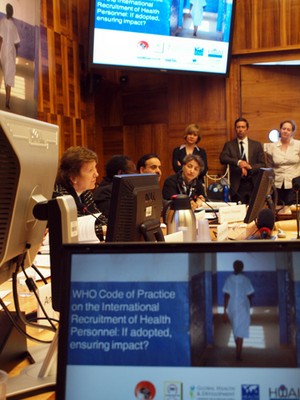Side event to the World Health Assembly. “This event explores the role of various stakeholders in promoting and monitoring compliance with the proposed Code due to be adopted at the 2010 World Health Assembly.”
Background
The proposed WHO Code of Practice on the International Recruitment of Health Personnel aims to promote the equitable balance of the interests of health workers, source countries and destination countries, while placing particular emphasis on ameliorating the negative effects from the international migration of health workers on countries experiencing health workforce crises.
The draft Code of Practice, developed by the WHO over the past two years through a multi-stakeholder consultation process, will be presented for adoption at the upcoming 63rd World Health Assembly. Like any international agreement, effective implementation is a key challenge. Implementation and monitoring of the Code of Practice will require strong support and proactive measures, not only by the World Health Organization and its Member States, but also by civil society organizations at national and global levels.
If adopted, the new Code of Practice will be the fourth instrument of legal character developed by the WHO. The Framework Convention on Tobacco Control (FCTC) and the International Health Regulations are legally binding international treaties promulgated by the WHO. Although a voluntary instrument, the Code of Practice on the International Recruitment of Health Personnel contains procedural elements and structure that give it legal character. WHO has also previously adopted the International Code of Marketing of Breast-Milk Substitutes, a non-binding instrument that has truly been transformative and saved the lives of countless infants around the world.
Civil society played a central role in the development of the FCTC and the Breast-Milk Substitutes Code. The protracted negotiation of these two instruments also allowed for the organization of civil society consortiums with respect to monitoring compliance and supporting implementation of these instruments. To date, a diverse range of civil society organizations has been actively involved in the development of the new Code. The organizers believe that at this critical stage it is vital to engage broader civil society participation in the process.
Objectives
- Facilitate greater understanding of the proposed Code;
- Emphasize importance of implementation plans at national, regional and international levels;
- Learn from existing efforts and discuss civil society collaboration and engagement; and
- Enable organization of international civil society to support implementation of and monitor compliance with the new Code of Practice.
Speakers
- Peggy Clark, Global Health & Development, The Aspen Institute
- Annelies Allain, International Baby Food Action Network
- Francis Omaswa, ACHEST, former Head of the Global Health Workforce Alliance
- Amy Hagopian, Health Alliance International
- Ibadat Dhillon, Aspen Institute Global Health & Development
Chair: Hon. Mary Robinson, President of Realizing Rights: The Ethical Globalization Initiative, Former President of Ireland, Former UN High Commissioner for Human Rights
Organizers
The meeting was organized by a group of civil society organizations and networks:
- Action Group for Health, Human Rights and HIV/AIDS (AGHA) Uganda
Contact: Sandra Kiapi - African Centre for Global Health and Social Transformation (ACHEST)
Contact: Francis Omaswa - Aspen Institute Global Health & Development
Contact: Ibadat Singh Dhillon - Health Alliance International (HAI)
Contact: Amy Hagopian - Health Workforce Advocacy Initiative (HWAI)
Contact: Eric Williams - Medicus Mundi International Network
Contact: Thomas Schwarz, Anke Tijtsma - Merlin
Contact: Fiona Campbell - Realizing Rights: The Ethical Globalization Initiative
Contact: Ibadat Singh Dhillon - Wemos Foundation
Contact: Anke Tijtsma
Contact
Program coordination: Anke Tijtsma
Project Coordinator Human Resources for Health
Wemos Foundation, Amsterdam, The Netherlands
anke.tijtsma@wemos.nl
Phone: +31 (0)20 435 2057
Technical coordination: Thomas Schwarz
Executive Secretary
Medicus Mundi International Network
Basel, Switzerland
schwarz@medicusmundi.org
Phone: +41 61 383 18 11 (Mon.-Wed.)

